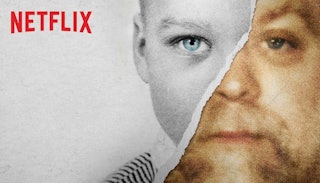The Moms Of 'Making A Murderer'

Unless you’ve spent the past few days on a social media break, you’ve undoubtedly heard of, or watched, the Netflix original series Making a Murderer. I put off watching it as long as I could, because I was still basking in the afterglow of a Luther binge. But my daughter, a college sophomore home for winter break, asked if I’d sit down and start watching it with her. People, when your college kid asks you to sit down and do anything with them, you do it. And so we began what turned into a marathon viewing session. We couldn’t stop watching.
We’re in Minnesota, so the decidedly Midwestern minutiae didn’t affect our initial viewing as much as it might have for other people. If you live in certain parts of Minnesota, Michigan or Wisconsin, you have interacted with people exactly like the Avery family. I didn’t even realize they had used some subtitles until a friend on Facebook mentioned them. The kitsch of the upper-Midwest ’90s was amusing at first—everything from the mullets to the giant eyeglasses to the amazing owl lamps in Dolores Avery’s living room. But before we knew it, the story was all we could focus on.
I won’t spoil it for those who haven’t watched yet, but here is the basic premise: A Wisconsin man, Steven Avery, was convicted of sexual assault and attempted murder in 1985, and spent 18 years behind bars before advances in DNA analysis linked a different man to the crimes. Steven was no saint: He’d had several other run-ins with the law, and I cannot get the image of what he did to the family cat out of my mind. Clearly, he wasn’t a model citizen to begin with, but the case against Avery had holes bigger than my bangs in 1992.
Two years after being released, and shortly after Mr. Avery decided to sue Manitowoc County, Wisconsin, and several officials, he was again arrested—this time for the murder of a local photographer, 25-year-old Teresa Halbach. Again, to reduce any spoilers, I won’t reveal much more of the story here. Get thee to Netflix.
I’m a mom and have been for almost 22 years now, and it really does change your worldview. I see everything through Mom Goggles, and this show was no exception. My heart ached for Dolores Avery, a soft-spoken, life-worn woman and the mother of Steven, when she described how she went to visit her son in prison. “Even when it was icy, I drove there,” she said in her Sconnie accent. Anyone who lives where we do knows that driving on winter-ravaged roads isn’t something you do for just anyone. But a mother’s love outweighs the terror of white-knuckling it down a road covered in glare ice.
The other mom in the documentary who touched my heart was Barb, the mother of teenager Brendan Dassey, who comes into play during the investigation of Teresa Halbach’s murder. Brendan, who is one of the most tragic real-life characters I’ve ever encountered, has several recorded telephone conversations with his mom. Each one is as heartbreakingly simple as they come, but reveal so much about the relationship between this boy and his mother. The Barb quote that had me bawling? It’s when she says to her obviously challenged boy, a boy who had absolutely no idea how deep into a shitty mess he was: “You’re not stupid to me.” For any mother who has consoled a child fraught with insecurity and self-doubt, those words were a gut punch.
All of the mothers in this sad, insanely addicting, infuriating and intriguing tale are faced with situations most of us can’t fathom, from Dolores visiting her son in prison after prison, to Barb finally losing it in a swarm of vulture-like reporters to Teresa Halbach’s mom, whom we don’t hear much from but is the mother who truly lost the most in this tragic chain of events.
The mothering stories in this series bring the differences in our lives out into the light. The tools we have or don’t have available as parents, the educational opportunities (or lack thereof), the complicated world of genetics, income and social classes—they all play parts in how we parent and, ultimately, what kind of lives we give our children.
The entire story unfolds like a fitted sheet falling out of the linen closet—a twisted, frustrating mess that seemingly defies logic. If you haven’t watched it yet, I strongly suggest you do. It will make you mad, probably sad too, but it will do amazing things for your perspective.
After watching this, the pile of dirty plates in my teenager’s bedroom and his absolute lack of concern about them didn’t seem like such a personal affront anymore. And yes, I hugged my kids. As hard as I could.
This article was originally published on